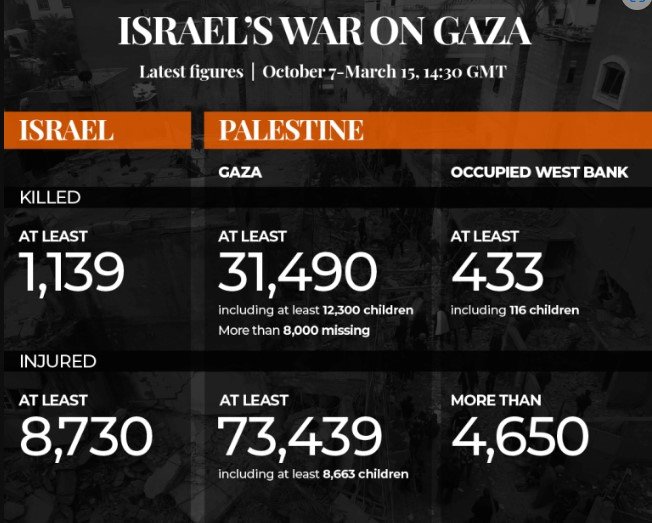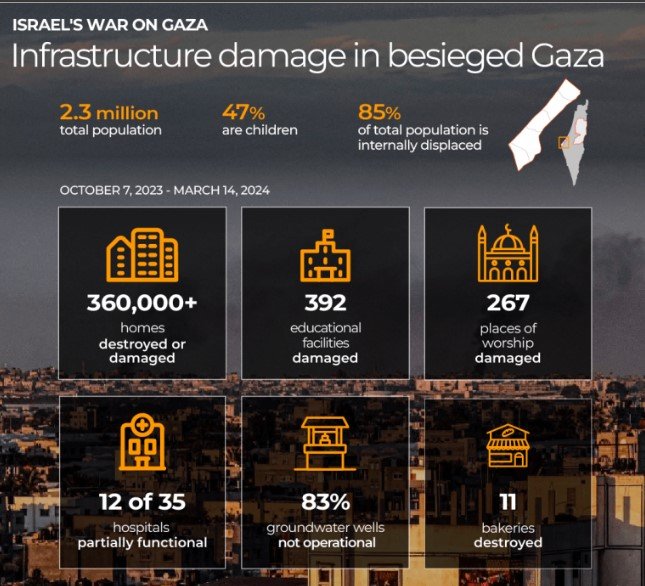‘Rock-solid, Unwavering, Unshakeable,’ this is how USA’s President Joe Biden describes his commitment to Israel after the October 7 attack but his rhetoric has changed now in the face of Israel’s indiscriminate brutality in Palestine. Days after the attack, the USA sent two military aircraft carrier strike groups to the Middle East, signaling unprecedented support to Israel but five months later, more than 1,000 US troops set to sail to build a vast, floating harbor to supply aid to the besieged Gaza strip.
You Can Also read: EU URGES US TO HALT WEAPON SUPPLY TO ISRAEL
The contrasting missions have signaled the strain contained in Washington’s policies but experts said that it is highly unlikely to scale back the USA’s military flow to Israel. President Joe Biden has recently warned Israeli Prime Minister Benjamin Netanyahu that he is ‘hurting Israel’ and sought candidly about ‘come to Jesus’ conversations with the leader over the growing humanitarian crisis in Gaza, where every hour, an average 5 people including 6 children are being killed.
Biden this weekend warned Netanyahu that an attack on Rafah—where hundreds of thousands of displaced Gazans have congregated—would be a ‘red line’ and that Israel ‘cannot have 30,000 more Palestinians dead’. At the same time, he said that his commitment to Israel’s defense is sacrosanct. In another extraordinary development, top U.S. intelligence agency chiefs warned publicly in testimony to Congress this week that Netanyahu’s political future was in grave jeopardy, and Senate Majority Leader Chuck Schumer on Thursday (March 15) called for Israeli elections on replacing him in a blistering Senate speech.
Asked about Schumer’s remarks on Friday, Biden told reporters: “He made a good speech, and I think he expressed a serious concern shared not only by him but by many Americans.”
USA Vice President Kamala Harris’ recent meeting with Benny Gantz, a member of Israel’s wartime Cabinet, reportedly caused frustration for Netanyahu. Gantz’s visit to Washington, which was seen as a challenge to Netanyahu, led to candid discussions with Harris and other top Biden advisers regarding apprehensions about a prospective operation in Rafah.
Since President Harry Truman recognized Israel in 1948, the U.S. has been a steadfast ally. However, recent tensions between President Biden and Prime Minister Netanyahu have spurred the U.S. administration to consider using its influence to deter Israel from a ground assault in the enclave’s south, aiming to provide humanitarian aid and minimize Palestinian civilian casualties.

President Biden’s campaign for re-election in 2024 complicates these diplomatic efforts. His advisors are wary of alienating pro-Israel Republican voters or further losing support from progressive Democrats critical of his staunch pro-Israel stance. Biden, self-described as a ‘Zionist,’ faces a dilemma if he chooses to pressure Israel, contradicting his long-standing support for the nation. ‘Biden is in a bind on how to deal with this crisis,’ observes Aaron David Miller, a seasoned Middle East negotiator across various administrations.
While Prime Minister Netanyahu is not enjoying widespread popularity in Israel, his government’s management of the war, particularly the decision to deploy troops to Rafah, receives broad backing from the Israeli public, irrespective of U.S. approval. Surveys indicate that while many Israelis concur with Netanyahu’s policies, there is also a strong desire for his departure from office.
This sentiment is echoed even among Netanyahu’s political adversaries, such as Benny Gantz of the National Unity party, who is also a war cabinet member and endorses the Rafah mission. This consensus presents a challenge to the White House’s attempts to navigate around Netanyahu’s leadership.
Netanyahu Defiant
In response to Biden’s ‘red lines’ comment, Netanyahu said “Well, I don’t know exactly what the president meant, but if he meant…that I’m pursuing private policies against the majority, the wish of the majority of Israelis, and that this is hurting the interests of Israel, then he’s wrong on both counts.”
Prime Minister Netanyahu is determined to continue the military operation in Rafah, the remaining area of the Gaza Strip yet to see a ground offensive. “The red line is preventing a repeat of the events of October 7,” Netanyahu stated to Politico on March 10.
Israel has communicated to the U.S. its readiness to face global criticism for its decisive military actions. Despite no current indications of an imminent attack on Rafah, President Biden and his team have consistently advised Israel to exercise caution, echoing the European Union’s view that such an attack would be disastrous.
The U.S. has intensified its public stance following the tragic loss of over 100 Palestinians in northern Gaza earlier this month. In response to the sluggish delivery of land-based aid by Israel, the Biden administration initiated airdrops of humanitarian supplies and proposed the construction of a maritime aid platform off Gaza’s coast.
President Biden had previously expressed optimism for a ceasefire agreement between Israel and Hamas before Ramadan but hopes faded as mediators departed Cairo without a resolution. Nonetheless, Biden maintains that an agreement remains within reach, with CIA Director Bill Burns actively involved in regional negotiations, following discussions with Mossad’s David Barnea. Mossad has acknowledged ongoing ceasefire talks, despite diminishing expectations for an immediate resolution.
Biden’s Publicity Stunt?
Palestinian rights advocates have cautioned Biden’s words as merely a means of allaying criticism without taking substantial action. Biden has faced intense scrutiny for his support of Israel’s military offensive in Gaza, which has killed more than 30,000 Palestinians since October 7. And the US remains one of the last countries in the world to oppose ending the war.

The US president’s recent furious statements did not signal any major shift in policy. Rather, his administration has reaffirmed that it will never restrict or scale back military aid to Israel. “It doesn’t matter whether Biden and Bibi [Netanyahu] like each other or not because, at the end of the day, American money is still being transferred to fund the Israeli army. Weapons are still being sent with or without Congress’s approval,” said Laura Albast, a Palestinian American organizer in the Washington, DC, area. “Biden did not come out and call for a ceasefire.”
Albast said the Biden administration is engaging in occasional criticism of Israel to address growing domestic concerns about the atrocities in Gaza. She noted that Biden’s popularity in the US has plunged during the war, particularly among young people.
A Monmouth University poll this week showed Biden’s approval rating at a record low of 34 percent. Among voters under 34, that number tumbled to 23 percent. “They think that average voters in the United States are not critical thinkers, so they’re putting together this theatre,” Albast said.
Hours after Biden’s remarks about Israel’s ‘indiscriminate bombing’ of Gaza, the US voted against a United Nations General Assembly resolution calling for a ceasefire in Gaza. Days earlier, Washington had also vetoed a similar measure in the UN Security Council. Still, US officials have said on several occasions that they are raising concerns with their Israeli counterpart over civilian harm in Gaza.

“It’s clear that the conflict will move and needs to move to a lower-intensity phase, and we expect to see and want to see a shift to more targeted operations,” Secretary of State Antony Blinken told reporters recently.
Amer Zahr, a Palestinian American comedian and activist, said Biden is trying to avoid responsibility for the carnage in Gaza, even as his administration seeks billions of dollars in additional assistance to Israel. He called reports of a feud between Biden and Netanyahu a ‘distraction’. “This is an attempt by the Biden administration to distance themselves from the genocidal policies of Netanyahu, which they have supported from the beginning,” Zahr added.


